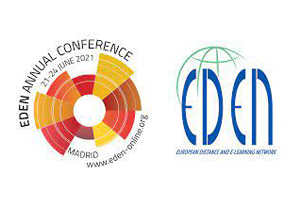
Madrid, 21-24 junio de 2021
Fin participación: 15 de mayo 2021
Formato virtual.
The gradual transition from traditional classroom-based education to online teaching and learning has been accelerated by the global crisis caused by the COVID-19 pandemic. Since it started, our way of life, work, and education have been irrevocably changed. When we look back upon this extraordinary period in our history, we see that this crisis has forced educators to reappraise their roles, professional practices, and beliefs. As a consequence, teachers and students have been forced online, highlighting a range of skills and knowledge that were sorely in demand. There has been an inevitable need for educational institutions to make key strategic decisions on how to provide both access to relevant tools, support in their use, and training for both educators and learners, so that teaching staff can engage online with their students in a meaningful way.
EDEN has a long history of supporting educators in online and distance education, providing a forum for discussion, learning, and refinement of best practices in this area. This pandemic has been no exception. Since the first national lockdowns started in European countries back in early 2020, a series of initiatives have been launched to support EDEN members during this crisis. The interest shown by members for these initiatives has been very high, with large numbers of participants and a clear desire to share and reach consensus.
This year’s conference is, therefore, intended as a continuation of the efforts of EDEN to support educators by providing a space to explore the issues and insights that have emerged during the COVID-19 pandemic. It is intended to enable educators to share their experiences and best practices related to a range of topics relevant to this situation. These topics are explicitly listed below but include issues such as: learner-centeredness in education; the continued evolution of online and distance learning; transitioning from emergency remote teaching to online learning; digital preparedness, digital literacy, and digital citizenship; the continued adoption of Artificial Intelligence; methodological advances; potentiating health and wellness in online education; and non-traditional assessment solutions.




